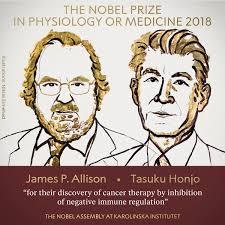
The 2018 Nobel Prize in Physiology or Medicine was awarded to James P. Allison and Tasuku Honjo for discoveries that have led to new medicines that activate the immune system and drive it to fight cancers. These therapies can defeat even the deadliest malignancies.
Two scientists, Professor James P Allison from the US and Professor Tasuku Honjo from Japan, who discovered how to fight cancer using the body's immune system have won the 2018 Nobel Prize for physiology or medicine. Their work has led to treatments for advanced, deadly skin cancer.
Immune checkpoint therapy has revolutionised cancer treatment, said the prize-giving Swedish Academy.
Their groundbreaking work on the immune system has paved the way for a new class of cancer drugs that are already dramatically changing outcomes for patients. It is the first time the development of a cancer therapy has been recognised with a Nobel prize.
Accepting the prize, Tasuku Honjo told reporters: "I want to continue my research ... so that this immune therapy will save more cancer patients than ever."
Prof Allison said: "It's a great, emotional privilege to meet cancer patients who've been successfully treated with immune checkpoint blockade. They are living proof of the power of basic science, of following our urge to learn and to understand how things work."
Treating the untreatable
The immune system normally seeks out and destroys mutated cells, but cancer finds sophisticated ways to hide from immune attacks. One way is by ramping up braking mechanisms designed to prevent immune cells from attacking normal tissue. In the 1990s, Allison discovered the first of these built-in brakes, known as checkpoints. Other teams were investigating the potential of enhancing the action of checkpoints to treat autoimmune diseases, but Allison showed that doing the reverse – switching off the brakes – could produce remarkable results in treating mice with cancer.
Independently, in 1992, Honjo discovered a second checkpoint that worked through a different mechanism and treatments based on this work have produced dramatic improvements to patient outcomes in the clinic.
The concept of mobilising the immune system to tackle cancer was first proposed more than a century ago, but they are only now being turned into clinical treatment after the recent discoveries of Allison and Honjo.
The resultant drugs, known as checkpoint inhibitors, have significant side effects, but have been shown to produce remarkable results in treating lung cancer, renal cancer, lymphoma and melanoma.
It doesn't work for everyone, but for some patients it appears to have worked incredibly well, getting rid of the tumour entirely, even after it had started to spread around the body.






